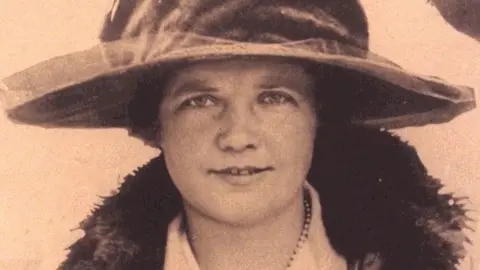Statue to honour woman who fought for voting rights
 Parasol Media Ltd
Parasol Media LtdCouncil planners have given permission to erect a statue of a prominent suffragette in her hometown to honour its women.
Lady Rhondda, born Margaret Haig-Thomas, grew up in Newport and led a 40-year campaign for women to be allowed to sit in the House of Lords.
Sadly, she died before the law she fought for was changed, too late to take her own seat.
Council officers gave the green light for the bronze 8ft (2.43m) statue to be placed on the eastern side of the Millennium Footbridge in Newport city centre.
It is being sculpted by artist Jane Robbins, will be the fourth in a series of five statues celebrating inspirational Welsh women.
Lady Rhondda's statue has won the support of those living near the proposed site, with a dozen letters of support – and no objections.
One respondent said it was "about time that Newport had a statue of a woman in the city".
"It's great that she's finally getting the recognition that she deserves," they added.
Another supporter said the statue "shines a strong light on the role of women, and in particular a famous leader of women and the suffragette movement who lived in Newport for most of her active life".

Last year, a statue of the poet Cranogwen, her bardic name, became only the third sculpture in Wales of a real woman.
A pioneer in many fields she challenged expectations of women during the Victorian era and became the first woman to win a poetry prize at the National Eisteddfod.
Born in Llangrannog, Ceredigion, in 1839 as Sarah Jane Rees, she became one of Wales' most popular poets and also worked as a head teacher, ship's captain, campaigner and journalist.
In 2022, A statue of Elaine Morgan, one of Wales' leading writers and feminists, was unveiled in her home town in Mountain Ash, Rhondda Cynon Taf.
The coal miner's daughter, who excelled in both the arts and science, died in 2013 at the age of 92.
In 2021, a monument to honour Betty Campbell, Wales' first black head teacher and black history campaigner, was unveiled in Cardiff in what was believed to be the first statue of a named, non-fictional woman in an outdoor public space in Wales.
Mrs Campbell, who died in 2017, proved her doubters wrong after being told as a child that her dream job as a head teacher was "insurmountable".
The statue was commissioned following a BBC Wales Hidden Heroines poll after a panel of experts made a list of 50 historic Welsh women after finding there were no statues celebrating heroines in Wales.
Campaign group Monumental Welsh Women has said its fifth and final statue will honour Elizabeth Andrews (1882-1960), described as "one of the most influential Welsh female political activists of the early 20th century".
As the first Labour Party women's organiser for Wales, she set up women's sections, describing them as "working women's universities".
One of her earliest tasks was translating leaflets from English to Welsh to urge women to use their newly-won vote.